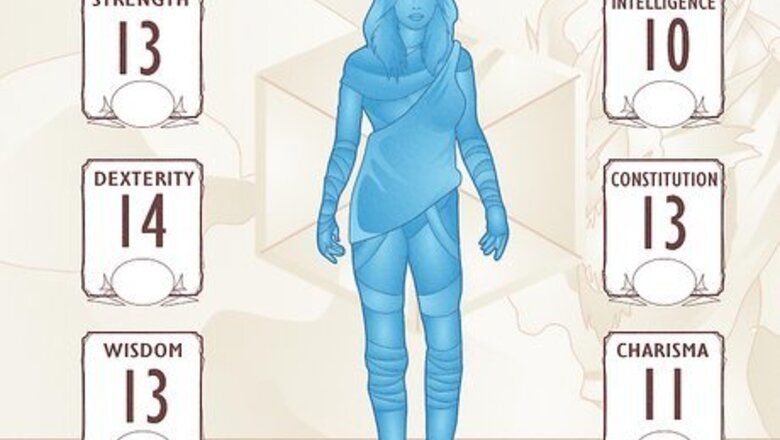
views
What is the Point Buy system?
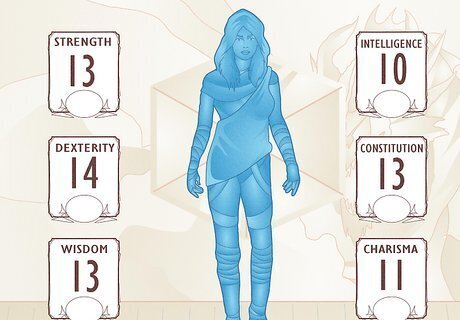
The point buy system is a method for getting DnD character stats. In Dungeons and Dragons, every character has 6 stat lines, known as “ability scores,” that reflect that character’s physical, mental, and emotional characteristics. The ability scores are: Strength (STR): How physically strong and powerful your character is. Dexterity (DEX): How good your character’s hand-eye coordination and agility are. Wisdom (WIS): How perceptive, insightful, and mentally adept your character is. Intelligence (INT): How well-read, intelligent, and smart you are. Constitution (CON): Your character’s ability to endure pain, stay focused, and survive. Charisma (CHA): How lovable, attractive, and enchanting your character can be.
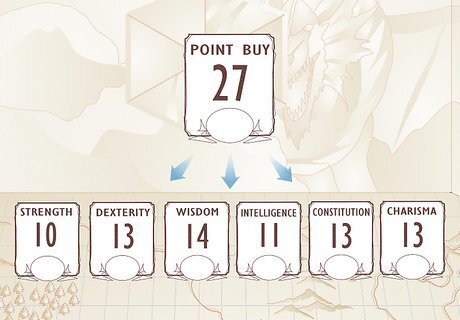
With point buy, all players “buy” their stats using 27 points. Every ability stat ranges from 1 (low) to 20 (high). A character with a strength of 8, for example, may be a bit of a weakling, while a strength of 18 could be a world-class bodybuilder. There are a few different ways to assign your character’s scores. With point buy, you “purchase” each stat with a pool of 27 points and put each score in whatever stat you want. The costs are: 8 = 0 points 9 = 1 points 10 = 2 points 11 = 3 points 12 = 4 points 13 = 5 points 14 = 7 points 15 = 9 points
Using the Point Buy System

Choose your character’s race. Every race in DnD has bonuses and drawbacks in the form of modifiers, which are positive or negative numbers you add to the ability stats. For example, Dwarves are known for mining and digging deep below the surface of the earth, which toughened them up. So, they get +2 bonus to their constitution score. Choose your race and note the bonuses. There are other options, but the core DnD races are: Human, Dwarf, Dragonborn, Gnome, Elf, Half-Elf, Halfling, Tiefling, and Half-Orc. If you’ve never built a character before, read through your race’s entire section in the 5e Player’s Handbook. The handbook walks through everything you need to know about your race so you can make your character by following along.

Select the class you want to play. Once you’ve got your race, select your class. This is basically like your “character type” and your choice determines which weapons, abilities, spells, and skills you can have. Like your race, every class gets certain bonuses and drawbacks. Choose your class after you’ve selected your race. The core options are: Cleric, Monk, Rogue, Wizard, Warlock, Ranger, Fighter, Bard, Druid, Barbarian, Paladin, and Sorcerer. If you’re new to DnD, read your class’s entire section in the 5e Player’s Handbook.
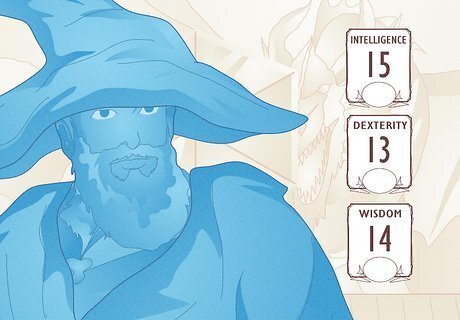
Identify which ability scores matter most to your class. Every class in DnD has a primary ability score based on what skills they rely on in combat and conversation. For example, Wizards acquire spells by studying them, so Intelligence is their primary ability score. Barbarians need strength, Rangers need dexterity, etc. Then, every class has 2 secondary ability scores based on what they rely on outside of their main skill. Figure out what 3 abilities you need to prioritize. A few examples: A Wizard is unlikely to need to beat something up when they’ve got all those powerful spells, so strength is usually unimportant. Also, who needs charisma when you can cast spells like Charm Person or Friendship? So, a Wizard usually prioritizes intelligence, followed by dexterity and wisdom. A Rogue primarily relies on dexterity to sneak around in the shadows. Then, they often need charisma to deceive, steal, or persuade in social situations. Lastly, Rogues need wisdom to be perceptive and stay alert. So, you can normally leave strength and intelligence for last when building a rogue.
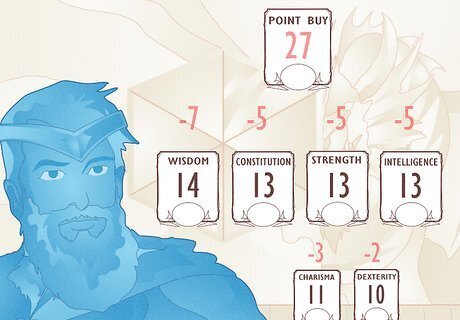
Spend your 27 points to assign the ability scores. Once you’ve got a race and class, spend the points in your bank to “buy” the specific stats you want. Prioritize your primary ability, followed by your secondary abilities, and spend less on the remaining two stats. Let’s walk through an example together: Clerics need a high wisdom score for their spellcasting. So, someone building a cleric might put a 14 in wisdom (-7 points). Then, they benefit from high strength in melee combat and high constitution in religious rituals. So, they may put two 13s in strength and constitution (-5 and -5). They’ve now got 10 points left, so they put a 13 in intelligence (-5) because it helps to be a little academically-minded if you’re studying religious texts, and an 11 in charisma (-3). Who needs to be suave if your deity has your back? Now, they only have 2 points left in their bank so they have to put a 10 in dexterity. After all, clerics rarely need to juggle, do acrobatics, or dance. Note: If you don’t want to do this manually on paper, use a free online point buy calculator.
Pros of the Point Buy System
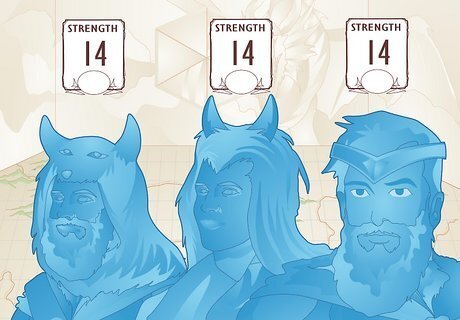
All players start out on basically the same power level. You’re not going to end up with a wildly unbalanced party composition if you use the point buy system. It’s not like one really lucky Barbarian with a 19 in strength is going to always pick up after the Druid who got unlucky and rolled all 8s and 9s. Every player will more or less be similarly strong, which is great if you want the party to feel like a cohesive team. The point buy system locks players into a very narrow range of scores. Every player will basically have a “good, not great” setup so far as the scores go.
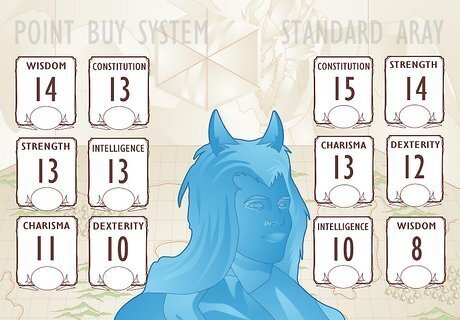
Players have a lot of freedom to customize their stats. The point buy system is way less chaotic than rolled stats, but it’s got a lot more variation than standard array, where every player is given 6 predetermined scores to put where they please. So, point buy is a nice middle ground—players can build a really “flat” character with even scores across the board, or a more lopsided character with high and low stats. DnD players tend to enjoy choices and freedom, and point buy gives them a good amount of that without leaving players at the whims of chaotic random roles.
Cons of the Point Buy System
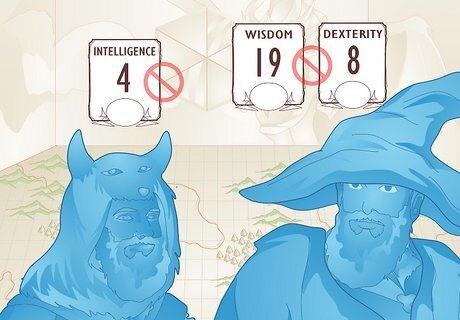
It minimizes the chances for whacky roleplay scenarios. With point buy, it’s impossible to build a character who is really over- or under-powered in a given area. However, those really high and low scores can be really fun! Think about how much fun it might be to roleplay an illiterate barbarian with an intelligence of 4, or a hyper-perceptive wizard with no hand-eye coordination (WIS of 19, DEX of 8). Those options are off the table with the point buy system. The lowest option with point buy is an 8. The highest option is 15. This doesn’t represent a very wide range relative to the other options, so characters tend to feel “flatter” than they otherwise would.
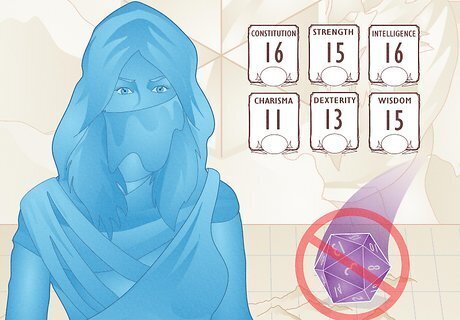
It takes some of the challenge out of character customization. With point buy, you face relatively few major decisions. You buy some 13- to 15s and put them in your best stats, then use the remainder of the points to fill out the less-relevant stats. Remember, every class in DnD has one key stat and two secondarily important stats. With point buy, it doesn’t take much work to figure out how to build your character. This is why a lot of veteran players prefer rolled stats, which involve random dice rolls. The randomness creates a more dynamic and interesting puzzle to solve in character creation.
Who should use Point Buy?

Point buy is a great option for newer or more laid-back players. If you’re DMing for a bunch of new players, point buy is a very intuitive and sensible system that gives players choices without making everything overwhelming. It’s also ideal for playgroups that are more about the social aspect of DnD and could care less about building the most optimal or strategic character. If you’ve got a bunch of seasoned players who love digging into the weeds to try and design uniquely powerful or strategically streamlined characters, point buy is unlikely the best way to go.
Alternatives to the Point Buy System

Standard array, where every player gets a predetermined set. Every player gets the same 6 numbers to use: a 15, a 14, a 13, a 12, a 10, and an 8. Players can put each number in whatever ability score slot they’d like, but they do not get anything outside of those 6 numbers. Pros: It minimizes differences between players in the party, it’s easy to understand, and it’s forgiving to new players. Cons: It involves very little choice and there aren’t any opportunities to fine-tune or optimize. Probably best for: Playgroups that get frustrated if the characters aren’t on the same power level and DMs who are running a death-heavy game (since it’s faster to reroll a character with standard array).
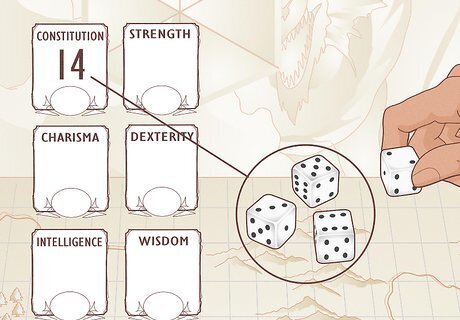
Rolled stats, where every player rolls random stats with dice. This is probably the most popular option. Take four 6-sided dice. Roll them. Remove the lowest-numbered roll, add the other 3 dice together, and jot the results down. Do this 6 times. These are your 6 ability scores and you can assign them as you’d like. Pros: Players can roll very unique characters with widely different stat scores. Cons: Players may end up rolling very underpowered characters if they’re unlucky, which can be frustrating. Probably best for: Traditionalists, hardcore DnD players, playgroups that enjoy more “intense” games of DnD, and people who enjoy a touch of randomness.


















Comments
0 comment